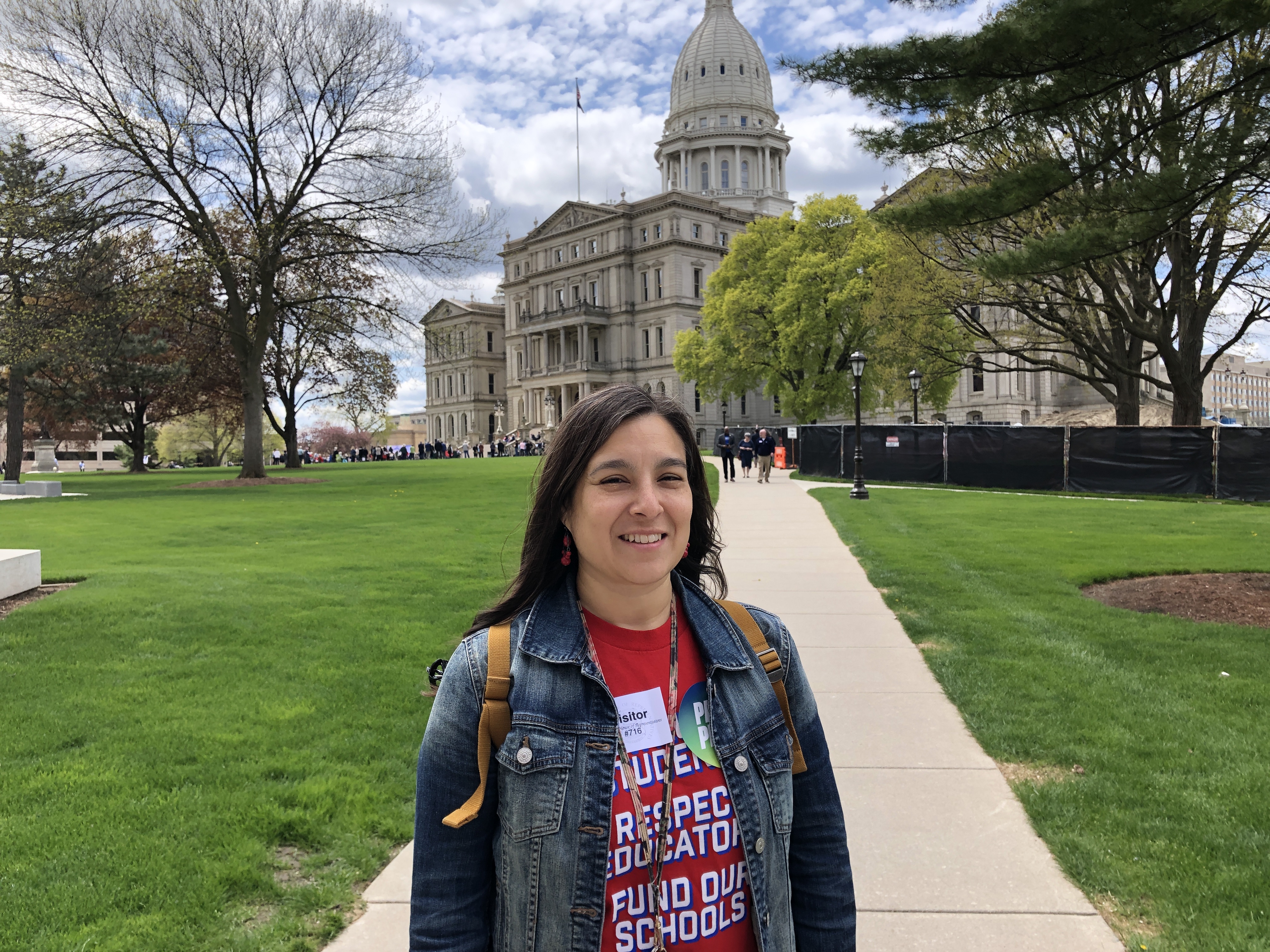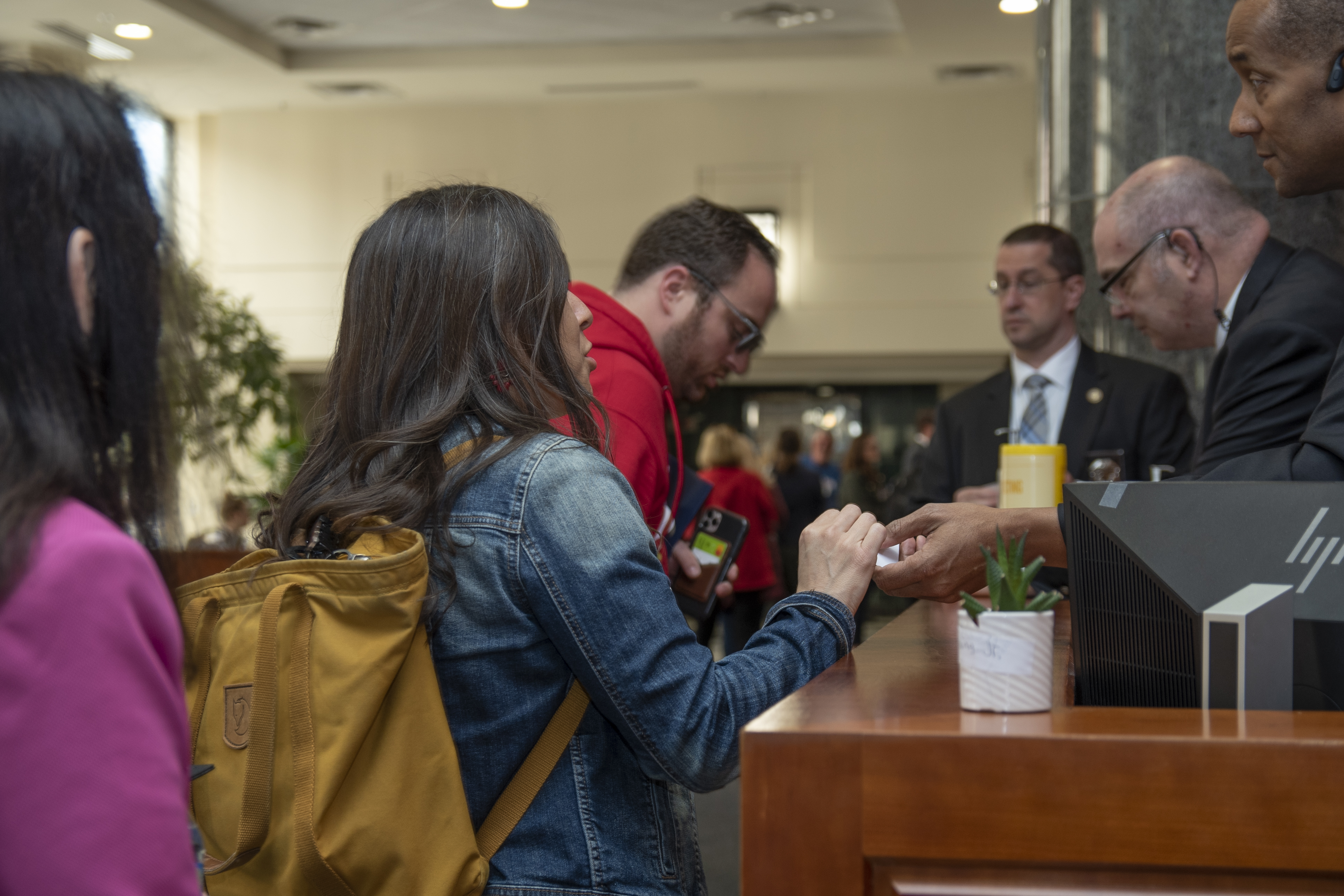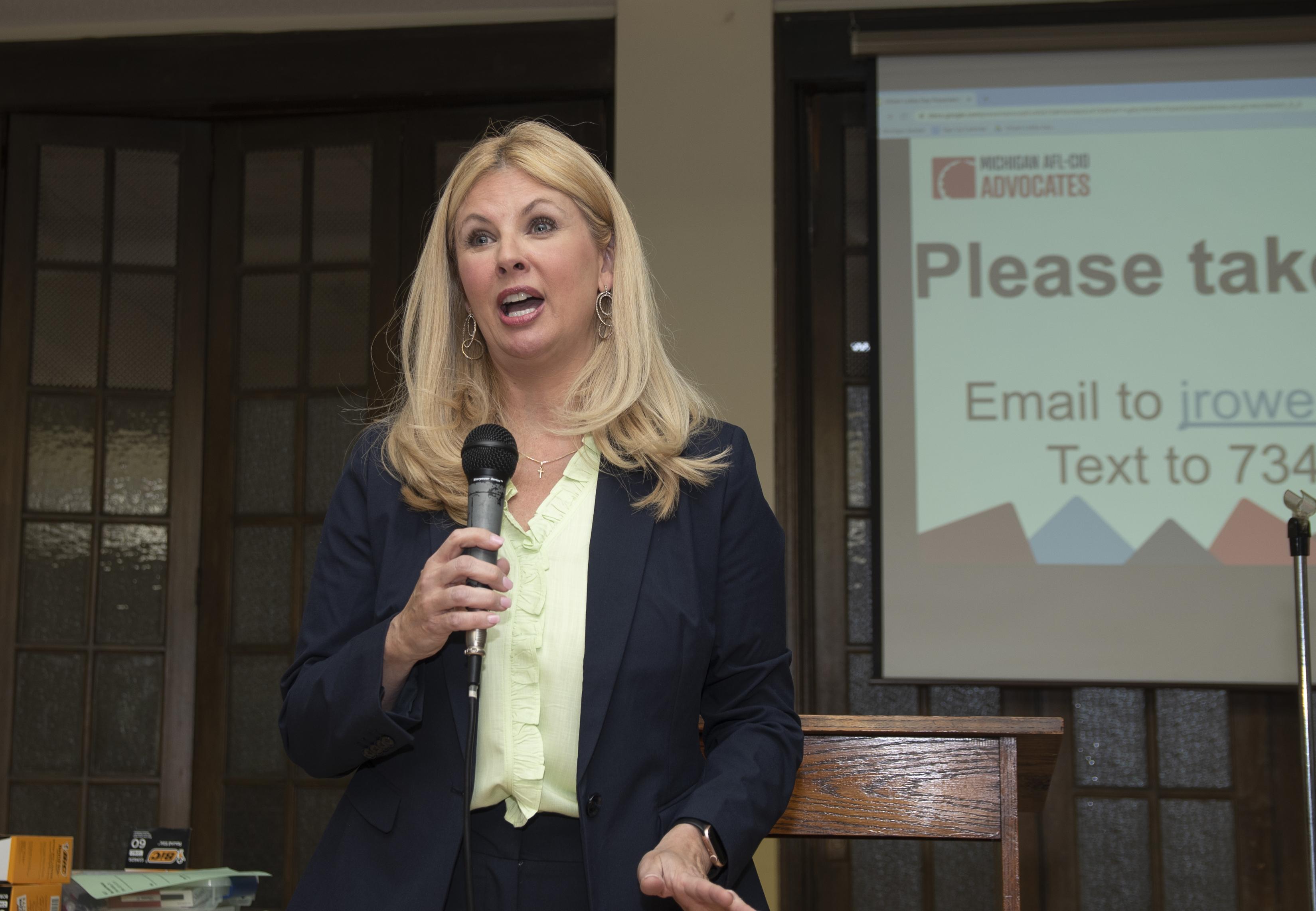Unions join together to lobby for return of collective bargaining rights: ‘This is the way we can make change for our students’
By Brenda Ortega
MEA Voice Editor
Five years ago when Nadia Rodriguez took a teaching job in Flint Community Schools, she knew world-changing history – the Flint Sit-Down Strike of 1937 – had played out on hallowed ground across the street from her K-3 Montessori classroom at Durant Tuuri Mott Elementary.

A Flint native who grew up in the city’s public schools, Rodriguez immediately joined her local union after having spent the first several years of her career at a non-union private school where teachers were loaded with unpaid extra duties and she saw an aide get fired after becoming pregnant.
But Rodriguez was soon dismayed to learn collective bargaining rights that decades ago so many risked everything to fight for had been stripped away from educators in Michigan under former Gov. Rick Snyder and unified Republican control of the Legislature in 2011-12.
With a new Democratic-led Legislature now considering a package of bills to restore those rights, Rodriguez last week was among more than 100 union members and leaders from a broad coalition of labor organizations who traveled to the Capitol to join forces in lobbying lawmakers for change.
“Growing up in Flint, we know this history, so to work in a building where we can look out the windows and it’s literally overlooking Chevy in the Hole – home of the original sit-down strike – and we don’t have these rights anymore? It’s a hard pill to swallow,” Rodriguez said.
The bills being considered would bring back bargaining rights first granted in 1964 under PERA, the Public Employment Relations Act which guaranteed public employees’ rights to organize and collectively bargain. A hearing scheduled for Thursday, May 11, was postponed due to votes scheduled for the state budget, but MEA anticipates full consideration of these bills soon.
Democratic lawmakers are getting pressure from opponents of the bills – and our strength is in our numbers. Add your voice to the chorus of people standing up for the rights of public employees by contacting your lawmaker today!
By weakening educators’ voice at the bargaining table over the last dozen years, policymakers effectively drove down pay and benefits while ratcheting up mandates and accountability and reducing public employees’ power to affect workplace conditions.
The resulting educator shortages and school staffing crisis are harming both students and the school employees who remain.

That is why Rodriguez came to Lansing last Thursday – to tell her story and advocate for her family, students, and profession, she said. Despite her years of experience, the divorced mother of two has remained frozen on the first step of her district’s salary schedule – making less than $40,000 per year.
“I attended the (MEA) Winter Conference in Detroit this year, and it really hit home that the Legislature is where you make policy and this is really the only way we can make actual change for our students,” she said of her reason for joining the historic multi-union Lobby Day.
The measures would restore many prohibited subjects of bargaining, eliminate provisions that penalize workers when a settlement is not reached before a contract expires, and repeal a prohibition on bargaining over privatization of services. Learn more about these important labor bills.
Like Rodriguez in Flint, support staff members in Bay City have seen wages erode since Republicans added financial penalties only for employees if a contract expires without a successor agreement in place, said Rick Meeth, president of the Bay City Education Association, who was among dozens of union members at the Lobby Day and who spoke at the morning orientation.
That means employers simply can drag their feet and win, Meeth said: “Superintendents have an unfair advantage at the bargaining table, and our hourly employees are especially vulnerable to it. You’re forced to say, ‘I guess I’ve got to take your weak offer, or else I’ll continue to lose because you refuse to bargain with us.’”
House Bill 4044 would repeal Public Act 54 of 2011, which currently prohibits any step increases and insurance cap adjustments when a contract expires and makes retroactive pay illegal in subsequent contracts.

Working together in a small group, Rodriguez and a few other union members from Genesee County had their first meeting of the day with Sharon Reeves, legislative assistant to Rep. Cynthia Neeley (D-Flint) and spoke about the need for HB 4044.
Employers have weaponized the current law to drive down pay and benefits which has pushed people away from the profession and put less qualified substitutes in front of kids, Rodriguez told Reeves.
“Our kids are not given an opportunity when they don’t have professionals in front of them, when we continue to have people in classrooms who are not certified, who are not building relationships. The kids don’t have consistency and structure.”
In her group’s second meeting of the day, Rodriguez told Rep. Jasper Martus (D-Flushing) that House Bill 4534 would restore prohibited subjects of bargaining – not mandating specific policies but simply allowing the two sides to negotiate on issues such as evaluation tools, layoff and recall policies, and teacher placement.

“The bill doesn’t do anything except give us back rights that we once had,” Rodriguez told Martus, one of the youngest representatives elected to the state House last year at age 22.
For example, Rodriguez explained she teaches in a non-traditional Montessori classroom which blends children in grades 1-3 together and allows teachers to be fluid in how they group students according to their abilities in different curriculum areas, she said.
Yet educators like her are being marked down under the standardized format of the evaluation system adopted by lawmakers in recent years, even though they aren’t teaching in a standardized way.
Checklists in the state’s evaluation tools have been rightfully criticized as too rigid, yet fixes can’t be negotiated because evaluation is a prohibited subject of bargaining, Rodriguez said. “We all can see the rubric doesn’t fit, and we really should have a different evaluation model, but we can’t change it.”

Other bargaining subjects lost in recent years have led to teachers being moved to different positions and grade levels against their will or even fired without the due process required to ensure fairness.
“We really need all of these bills to pass, and it’s important to us that they pass before summer,” Rodriguez said. “So if you encounter someone who maybe is on the fence and doesn’t understand how these laws are affecting teachers and students, we would be happy to share our personal experiences.”
Later in the day, Rodriguez’s group submitted a card to pull Rep. Neeley from the House floor to reinforce what they told her aide earlier: “We’re hoping these bills pass before summer, and we’d love to follow up with you,” Rodriguez told the second-term rep above the din of many union members lobbying in the lobby.
Nearby, two MEA-Retired members talked with legislators about how unilateral teacher placement decisions by administrators are fueling the educator shortage. Julie Ferrier, a retired special education teacher from Muskegon, said involuntary moves can make teachers miserable.
“Districts have a hard enough time finding teachers these days,” Ferrier said. “Do they really want to push people out by forcing them to teach something that’s not their expertise?”
Retired teacher and counselor Bridget Fox from Grand Haven told lawmakers amid the high-volume hallway lobbying: “What’s happening too often is teachers are being moved against their will because it’s easier for superintendents to do that than to hire and prepare people for roles they need filled.”
Coming from a family of educators, Rodriguez knows every public school employee has important experience and knowledge to share with representatives and senators – who need to hear those perspectives from the front lines before passing laws impacting public education.
She was initially nervous to take part in the union Lobby Day and made sure to study all of the bills, “but what really has the most effect is speaking from our experience and how these laws affect us and our ability to do our jobs,” she said.
Rodriguez’s mother worked for many years as a school social worker in Flint, retiring in recent years when her pay continued to decline below what she had made years prior. Now social worker positions are privatized in Flint, and students who require those services meet with someone online, Rodriguez lamented.
She hopes to testify in committee or before the House about House Bill 4356, which would repeal a provision that prohibits bargaining over contracting out non-instructional services.
“This is especially significant in our district,” she said. “Speech, social work, resource room, and paraprofessionals have been outsourced. Many of these people aren’t even located in our time zone, require additional staff to retrieve students and monitor their sessions, and regularly miss appointments.”

MEA President-Elect Chandra Madafferi met up with participants at last week’s Lobby Day and reminded union members they have a powerful voice in their communities and in the Legislature with many opportunities ahead to create the change they know is needed.
“I’m so excited about the future and encouraged that you’re all here,” Madafferi told the crowd. “I want to say thank you, but I also want you to realize all the power and influence you have and begin having these conversations all the time.”
Rodriguez said she decided to lift up her voice now because she wishes to give her students the kind of wonderful school experience she had growing up in Flint – and she sees an opportunity for such positive change to happen.
“People are surprised to hear I’m an avid skier, but it’s because of the opportunities we had at school that I learned,” Rodriguez said. “I was in ski club after school. Another great program I remember is Model U.N. We would travel to different conferences to compete around the state but also out of state and even in Mexico.”
Since joining the union, Rodriguez has become the local PAC chair, keeping members informed in the political realm, conducting fundraisers for the Political Action Committee fund (since dues dollars can’t be used for political purposes), and helping to screen and recommend local candidates for office.
Now an experienced educator, she could leave Flint and make thousands more dollars per year working elsewhere, but she doesn’t want to leave behind the children and community she loves.
“I love kids, I love learning, and I owe a lot of my passion and drive to the educators I had growing up,” she said. “I want these kids to have that passion. I want them to know we’re not just doing this because you have to – it’s because the more you know, the more access you have to the world.”
However, that doesn’t mean she isn’t frustrated to see a vital and noble profession so mistreated. “I’m here fighting for change because we shouldn’t constantly be asked to do more with less, whether it be the resources we need to teach or the paycheck we need to pay bills and put food on the table.”



